Developing Professional Practice: HR Agenda Analysis Report
VerifiedAdded on 2022/12/27
|9
|1889
|50
Report
AI Summary
This report delves into the analysis of internal factors that shape the HR agenda, focusing on the National Health Service (NHS) as a case study. It utilizes the Michigan model to illustrate how factors such as strategy objectives, HR strategy, stakeholder expectations, awareness, and organizational culture influence the HR agenda. Furthermore, the report outlines the key stages of strategy formulation and implementation, highlighting the roles of the HR manager in each stage, from overall strategy to HR outcomes and improved performance. The report also examines the crucial roles of HR managers in upholding business ethics and accountability, emphasizing their contributions to fostering a strong brand image and ensuring responsible task completion within the organization. The report concludes by emphasizing the importance of HR in promoting business ethics and accountability, leading to maximum benefits for the firm.
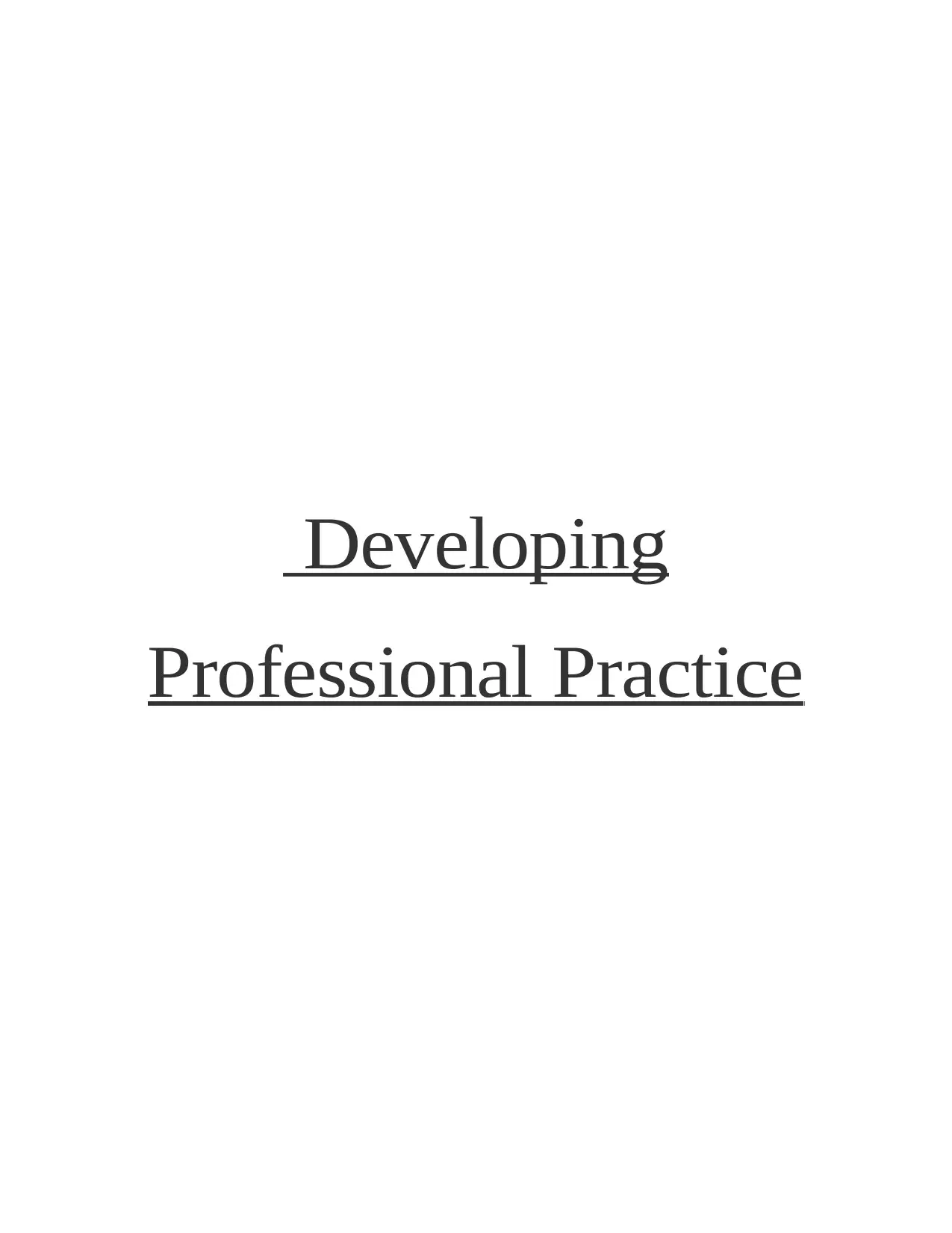
Developing
Professional Practice
Professional Practice
Paraphrase This Document
Need a fresh take? Get an instant paraphrase of this document with our AI Paraphraser
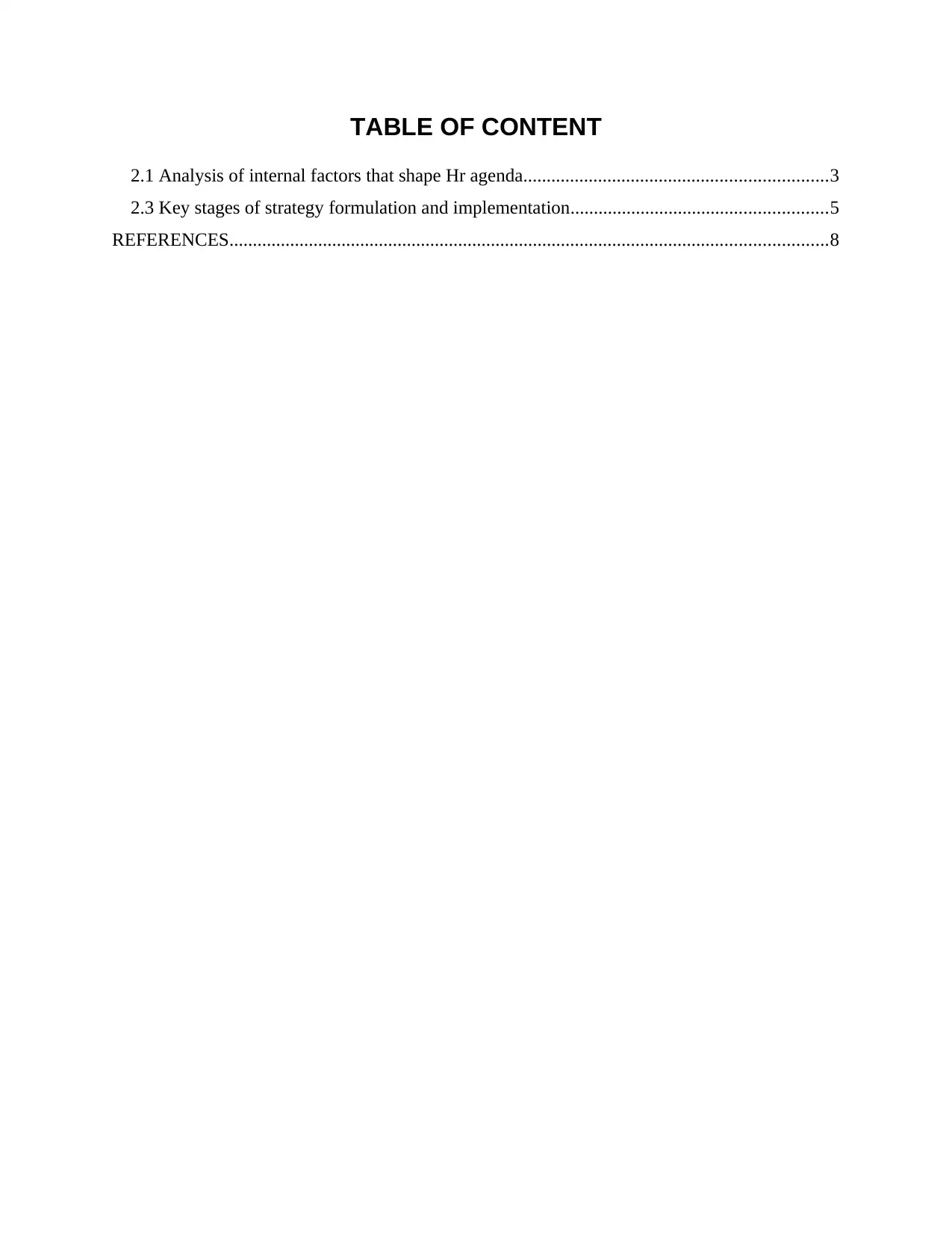
TABLE OF CONTENT
2.1 Analysis of internal factors that shape Hr agenda.................................................................3
2.3 Key stages of strategy formulation and implementation.......................................................5
REFERENCES................................................................................................................................8
2.1 Analysis of internal factors that shape Hr agenda.................................................................3
2.3 Key stages of strategy formulation and implementation.......................................................5
REFERENCES................................................................................................................................8
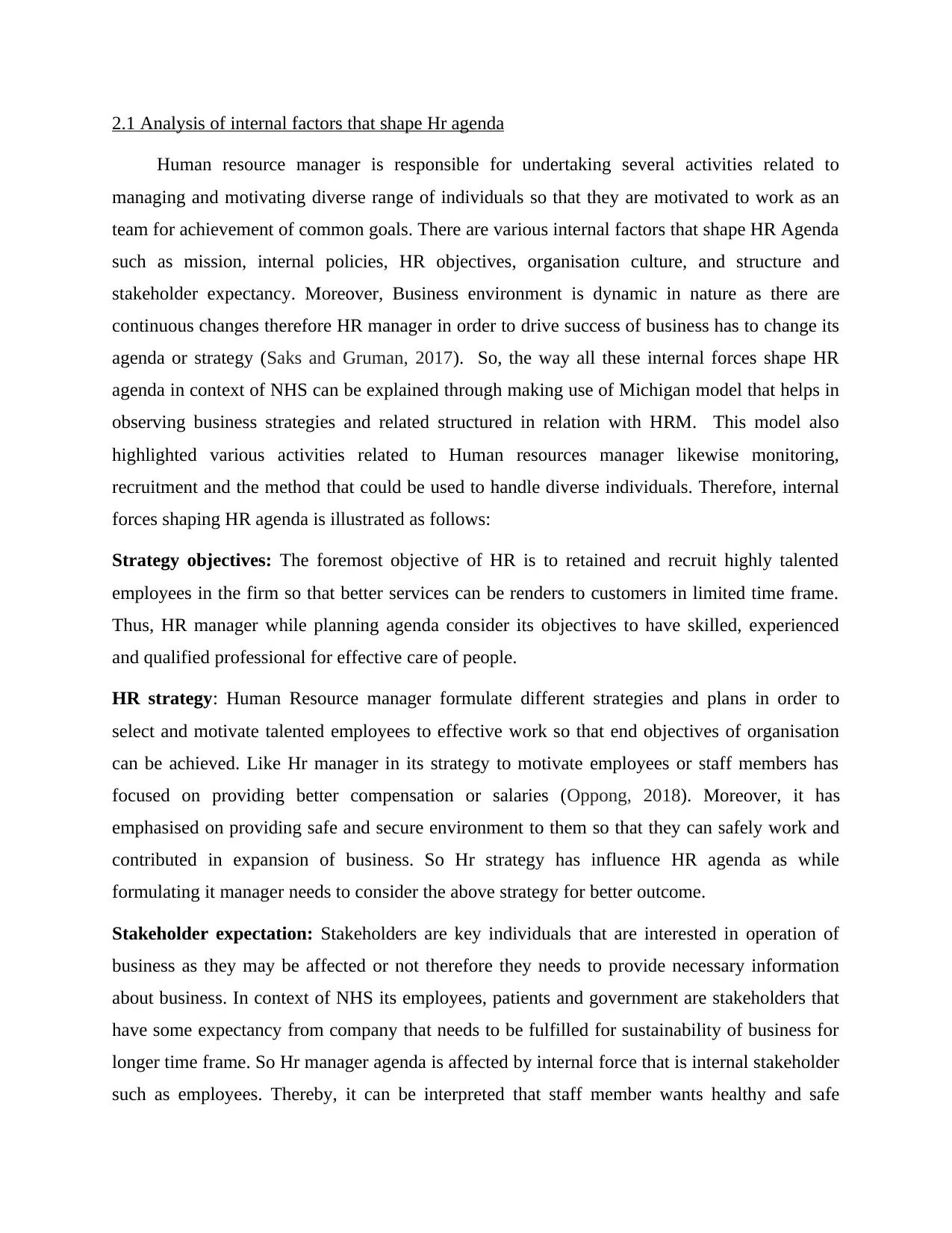
2.1 Analysis of internal factors that shape Hr agenda
Human resource manager is responsible for undertaking several activities related to
managing and motivating diverse range of individuals so that they are motivated to work as an
team for achievement of common goals. There are various internal factors that shape HR Agenda
such as mission, internal policies, HR objectives, organisation culture, and structure and
stakeholder expectancy. Moreover, Business environment is dynamic in nature as there are
continuous changes therefore HR manager in order to drive success of business has to change its
agenda or strategy (Saks and Gruman, 2017). So, the way all these internal forces shape HR
agenda in context of NHS can be explained through making use of Michigan model that helps in
observing business strategies and related structured in relation with HRM. This model also
highlighted various activities related to Human resources manager likewise monitoring,
recruitment and the method that could be used to handle diverse individuals. Therefore, internal
forces shaping HR agenda is illustrated as follows:
Strategy objectives: The foremost objective of HR is to retained and recruit highly talented
employees in the firm so that better services can be renders to customers in limited time frame.
Thus, HR manager while planning agenda consider its objectives to have skilled, experienced
and qualified professional for effective care of people.
HR strategy: Human Resource manager formulate different strategies and plans in order to
select and motivate talented employees to effective work so that end objectives of organisation
can be achieved. Like Hr manager in its strategy to motivate employees or staff members has
focused on providing better compensation or salaries (Oppong, 2018). Moreover, it has
emphasised on providing safe and secure environment to them so that they can safely work and
contributed in expansion of business. So Hr strategy has influence HR agenda as while
formulating it manager needs to consider the above strategy for better outcome.
Stakeholder expectation: Stakeholders are key individuals that are interested in operation of
business as they may be affected or not therefore they needs to provide necessary information
about business. In context of NHS its employees, patients and government are stakeholders that
have some expectancy from company that needs to be fulfilled for sustainability of business for
longer time frame. So Hr manager agenda is affected by internal force that is internal stakeholder
such as employees. Thereby, it can be interpreted that staff member wants healthy and safe
Human resource manager is responsible for undertaking several activities related to
managing and motivating diverse range of individuals so that they are motivated to work as an
team for achievement of common goals. There are various internal factors that shape HR Agenda
such as mission, internal policies, HR objectives, organisation culture, and structure and
stakeholder expectancy. Moreover, Business environment is dynamic in nature as there are
continuous changes therefore HR manager in order to drive success of business has to change its
agenda or strategy (Saks and Gruman, 2017). So, the way all these internal forces shape HR
agenda in context of NHS can be explained through making use of Michigan model that helps in
observing business strategies and related structured in relation with HRM. This model also
highlighted various activities related to Human resources manager likewise monitoring,
recruitment and the method that could be used to handle diverse individuals. Therefore, internal
forces shaping HR agenda is illustrated as follows:
Strategy objectives: The foremost objective of HR is to retained and recruit highly talented
employees in the firm so that better services can be renders to customers in limited time frame.
Thus, HR manager while planning agenda consider its objectives to have skilled, experienced
and qualified professional for effective care of people.
HR strategy: Human Resource manager formulate different strategies and plans in order to
select and motivate talented employees to effective work so that end objectives of organisation
can be achieved. Like Hr manager in its strategy to motivate employees or staff members has
focused on providing better compensation or salaries (Oppong, 2018). Moreover, it has
emphasised on providing safe and secure environment to them so that they can safely work and
contributed in expansion of business. So Hr strategy has influence HR agenda as while
formulating it manager needs to consider the above strategy for better outcome.
Stakeholder expectation: Stakeholders are key individuals that are interested in operation of
business as they may be affected or not therefore they needs to provide necessary information
about business. In context of NHS its employees, patients and government are stakeholders that
have some expectancy from company that needs to be fulfilled for sustainability of business for
longer time frame. So Hr manager agenda is affected by internal force that is internal stakeholder
such as employees. Thereby, it can be interpreted that staff member wants healthy and safe
⊘ This is a preview!⊘
Do you want full access?
Subscribe today to unlock all pages.

Trusted by 1+ million students worldwide
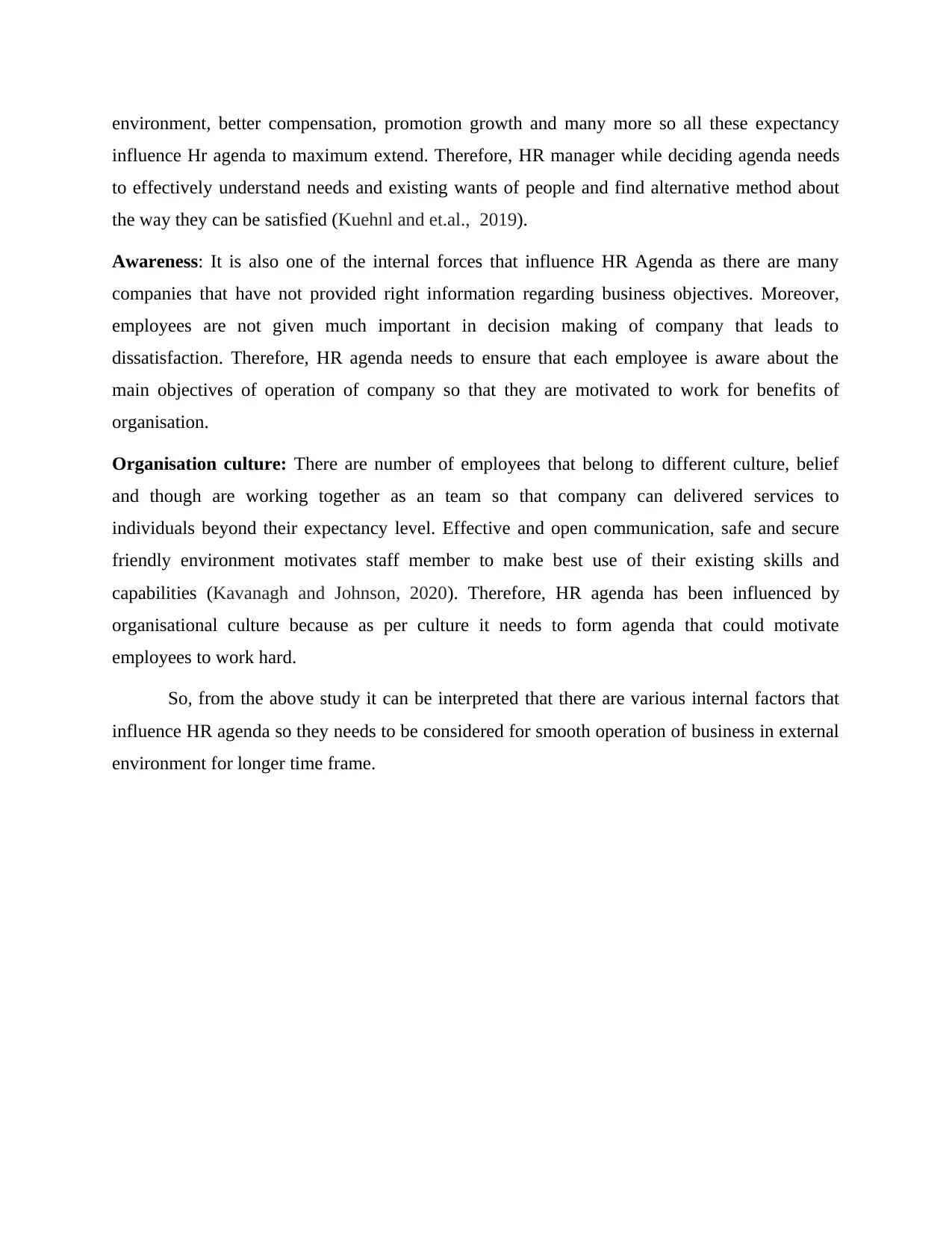
environment, better compensation, promotion growth and many more so all these expectancy
influence Hr agenda to maximum extend. Therefore, HR manager while deciding agenda needs
to effectively understand needs and existing wants of people and find alternative method about
the way they can be satisfied (Kuehnl and et.al., 2019).
Awareness: It is also one of the internal forces that influence HR Agenda as there are many
companies that have not provided right information regarding business objectives. Moreover,
employees are not given much important in decision making of company that leads to
dissatisfaction. Therefore, HR agenda needs to ensure that each employee is aware about the
main objectives of operation of company so that they are motivated to work for benefits of
organisation.
Organisation culture: There are number of employees that belong to different culture, belief
and though are working together as an team so that company can delivered services to
individuals beyond their expectancy level. Effective and open communication, safe and secure
friendly environment motivates staff member to make best use of their existing skills and
capabilities (Kavanagh and Johnson, 2020). Therefore, HR agenda has been influenced by
organisational culture because as per culture it needs to form agenda that could motivate
employees to work hard.
So, from the above study it can be interpreted that there are various internal factors that
influence HR agenda so they needs to be considered for smooth operation of business in external
environment for longer time frame.
influence Hr agenda to maximum extend. Therefore, HR manager while deciding agenda needs
to effectively understand needs and existing wants of people and find alternative method about
the way they can be satisfied (Kuehnl and et.al., 2019).
Awareness: It is also one of the internal forces that influence HR Agenda as there are many
companies that have not provided right information regarding business objectives. Moreover,
employees are not given much important in decision making of company that leads to
dissatisfaction. Therefore, HR agenda needs to ensure that each employee is aware about the
main objectives of operation of company so that they are motivated to work for benefits of
organisation.
Organisation culture: There are number of employees that belong to different culture, belief
and though are working together as an team so that company can delivered services to
individuals beyond their expectancy level. Effective and open communication, safe and secure
friendly environment motivates staff member to make best use of their existing skills and
capabilities (Kavanagh and Johnson, 2020). Therefore, HR agenda has been influenced by
organisational culture because as per culture it needs to form agenda that could motivate
employees to work hard.
So, from the above study it can be interpreted that there are various internal factors that
influence HR agenda so they needs to be considered for smooth operation of business in external
environment for longer time frame.
Paraphrase This Document
Need a fresh take? Get an instant paraphrase of this document with our AI Paraphraser
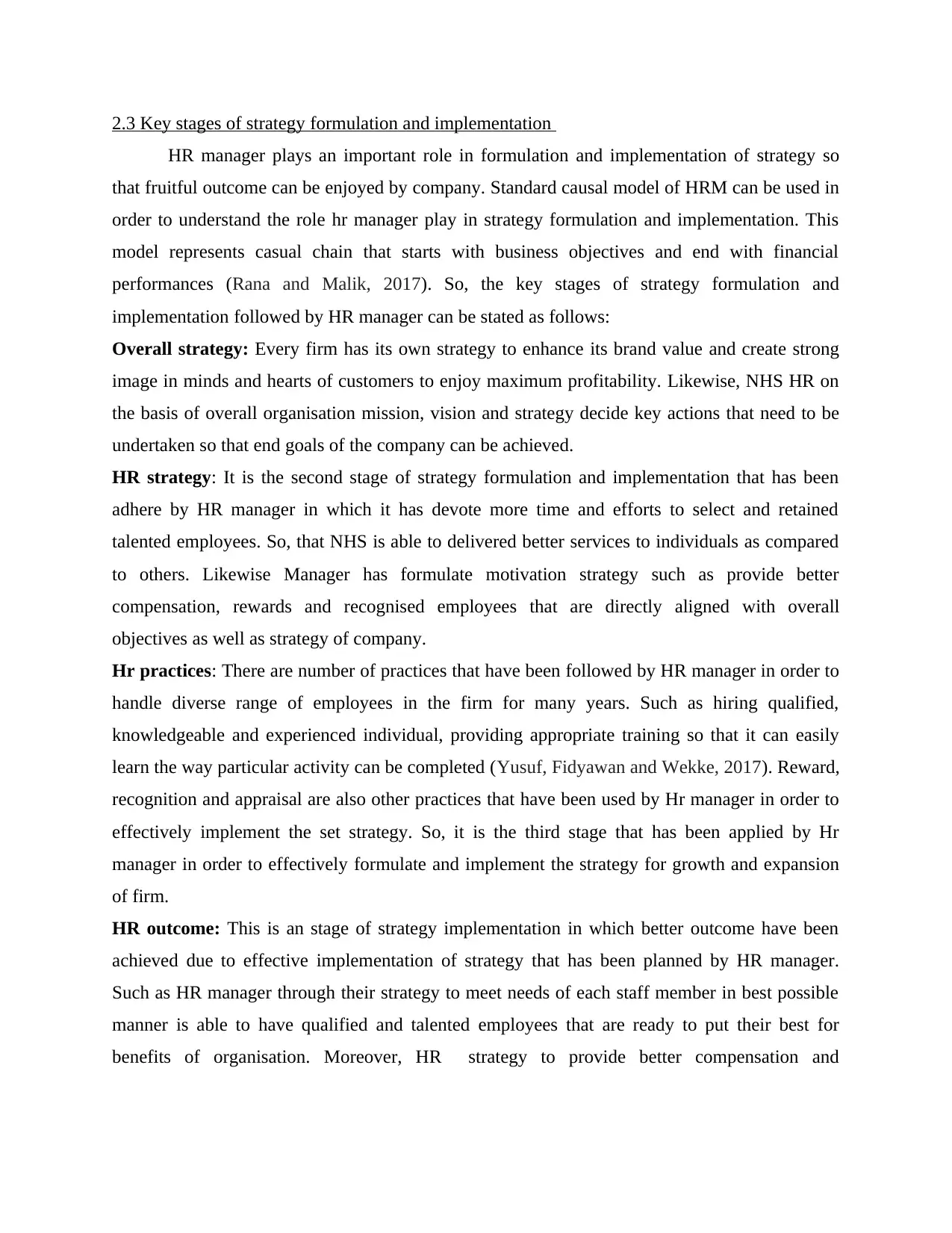
2.3 Key stages of strategy formulation and implementation
HR manager plays an important role in formulation and implementation of strategy so
that fruitful outcome can be enjoyed by company. Standard causal model of HRM can be used in
order to understand the role hr manager play in strategy formulation and implementation. This
model represents casual chain that starts with business objectives and end with financial
performances (Rana and Malik, 2017). So, the key stages of strategy formulation and
implementation followed by HR manager can be stated as follows:
Overall strategy: Every firm has its own strategy to enhance its brand value and create strong
image in minds and hearts of customers to enjoy maximum profitability. Likewise, NHS HR on
the basis of overall organisation mission, vision and strategy decide key actions that need to be
undertaken so that end goals of the company can be achieved.
HR strategy: It is the second stage of strategy formulation and implementation that has been
adhere by HR manager in which it has devote more time and efforts to select and retained
talented employees. So, that NHS is able to delivered better services to individuals as compared
to others. Likewise Manager has formulate motivation strategy such as provide better
compensation, rewards and recognised employees that are directly aligned with overall
objectives as well as strategy of company.
Hr practices: There are number of practices that have been followed by HR manager in order to
handle diverse range of employees in the firm for many years. Such as hiring qualified,
knowledgeable and experienced individual, providing appropriate training so that it can easily
learn the way particular activity can be completed (Yusuf, Fidyawan and Wekke, 2017). Reward,
recognition and appraisal are also other practices that have been used by Hr manager in order to
effectively implement the set strategy. So, it is the third stage that has been applied by Hr
manager in order to effectively formulate and implement the strategy for growth and expansion
of firm.
HR outcome: This is an stage of strategy implementation in which better outcome have been
achieved due to effective implementation of strategy that has been planned by HR manager.
Such as HR manager through their strategy to meet needs of each staff member in best possible
manner is able to have qualified and talented employees that are ready to put their best for
benefits of organisation. Moreover, HR strategy to provide better compensation and
HR manager plays an important role in formulation and implementation of strategy so
that fruitful outcome can be enjoyed by company. Standard causal model of HRM can be used in
order to understand the role hr manager play in strategy formulation and implementation. This
model represents casual chain that starts with business objectives and end with financial
performances (Rana and Malik, 2017). So, the key stages of strategy formulation and
implementation followed by HR manager can be stated as follows:
Overall strategy: Every firm has its own strategy to enhance its brand value and create strong
image in minds and hearts of customers to enjoy maximum profitability. Likewise, NHS HR on
the basis of overall organisation mission, vision and strategy decide key actions that need to be
undertaken so that end goals of the company can be achieved.
HR strategy: It is the second stage of strategy formulation and implementation that has been
adhere by HR manager in which it has devote more time and efforts to select and retained
talented employees. So, that NHS is able to delivered better services to individuals as compared
to others. Likewise Manager has formulate motivation strategy such as provide better
compensation, rewards and recognised employees that are directly aligned with overall
objectives as well as strategy of company.
Hr practices: There are number of practices that have been followed by HR manager in order to
handle diverse range of employees in the firm for many years. Such as hiring qualified,
knowledgeable and experienced individual, providing appropriate training so that it can easily
learn the way particular activity can be completed (Yusuf, Fidyawan and Wekke, 2017). Reward,
recognition and appraisal are also other practices that have been used by Hr manager in order to
effectively implement the set strategy. So, it is the third stage that has been applied by Hr
manager in order to effectively formulate and implement the strategy for growth and expansion
of firm.
HR outcome: This is an stage of strategy implementation in which better outcome have been
achieved due to effective implementation of strategy that has been planned by HR manager.
Such as HR manager through their strategy to meet needs of each staff member in best possible
manner is able to have qualified and talented employees that are ready to put their best for
benefits of organisation. Moreover, HR strategy to provide better compensation and
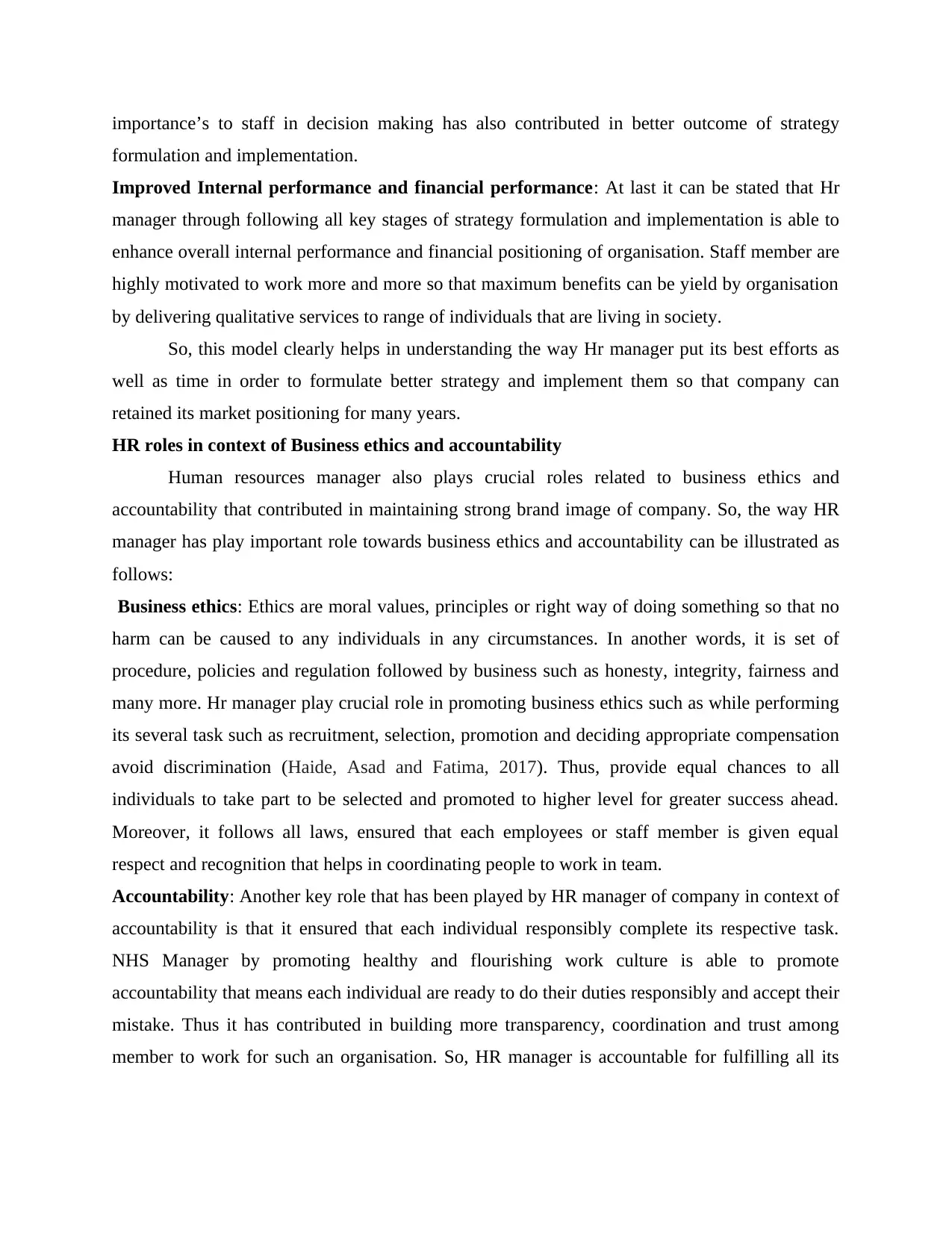
importance’s to staff in decision making has also contributed in better outcome of strategy
formulation and implementation.
Improved Internal performance and financial performance: At last it can be stated that Hr
manager through following all key stages of strategy formulation and implementation is able to
enhance overall internal performance and financial positioning of organisation. Staff member are
highly motivated to work more and more so that maximum benefits can be yield by organisation
by delivering qualitative services to range of individuals that are living in society.
So, this model clearly helps in understanding the way Hr manager put its best efforts as
well as time in order to formulate better strategy and implement them so that company can
retained its market positioning for many years.
HR roles in context of Business ethics and accountability
Human resources manager also plays crucial roles related to business ethics and
accountability that contributed in maintaining strong brand image of company. So, the way HR
manager has play important role towards business ethics and accountability can be illustrated as
follows:
Business ethics: Ethics are moral values, principles or right way of doing something so that no
harm can be caused to any individuals in any circumstances. In another words, it is set of
procedure, policies and regulation followed by business such as honesty, integrity, fairness and
many more. Hr manager play crucial role in promoting business ethics such as while performing
its several task such as recruitment, selection, promotion and deciding appropriate compensation
avoid discrimination (Haide, Asad and Fatima, 2017). Thus, provide equal chances to all
individuals to take part to be selected and promoted to higher level for greater success ahead.
Moreover, it follows all laws, ensured that each employees or staff member is given equal
respect and recognition that helps in coordinating people to work in team.
Accountability: Another key role that has been played by HR manager of company in context of
accountability is that it ensured that each individual responsibly complete its respective task.
NHS Manager by promoting healthy and flourishing work culture is able to promote
accountability that means each individual are ready to do their duties responsibly and accept their
mistake. Thus it has contributed in building more transparency, coordination and trust among
member to work for such an organisation. So, HR manager is accountable for fulfilling all its
formulation and implementation.
Improved Internal performance and financial performance: At last it can be stated that Hr
manager through following all key stages of strategy formulation and implementation is able to
enhance overall internal performance and financial positioning of organisation. Staff member are
highly motivated to work more and more so that maximum benefits can be yield by organisation
by delivering qualitative services to range of individuals that are living in society.
So, this model clearly helps in understanding the way Hr manager put its best efforts as
well as time in order to formulate better strategy and implement them so that company can
retained its market positioning for many years.
HR roles in context of Business ethics and accountability
Human resources manager also plays crucial roles related to business ethics and
accountability that contributed in maintaining strong brand image of company. So, the way HR
manager has play important role towards business ethics and accountability can be illustrated as
follows:
Business ethics: Ethics are moral values, principles or right way of doing something so that no
harm can be caused to any individuals in any circumstances. In another words, it is set of
procedure, policies and regulation followed by business such as honesty, integrity, fairness and
many more. Hr manager play crucial role in promoting business ethics such as while performing
its several task such as recruitment, selection, promotion and deciding appropriate compensation
avoid discrimination (Haide, Asad and Fatima, 2017). Thus, provide equal chances to all
individuals to take part to be selected and promoted to higher level for greater success ahead.
Moreover, it follows all laws, ensured that each employees or staff member is given equal
respect and recognition that helps in coordinating people to work in team.
Accountability: Another key role that has been played by HR manager of company in context of
accountability is that it ensured that each individual responsibly complete its respective task.
NHS Manager by promoting healthy and flourishing work culture is able to promote
accountability that means each individual are ready to do their duties responsibly and accept their
mistake. Thus it has contributed in building more transparency, coordination and trust among
member to work for such an organisation. So, HR manager is accountable for fulfilling all its
⊘ This is a preview!⊘
Do you want full access?
Subscribe today to unlock all pages.

Trusted by 1+ million students worldwide
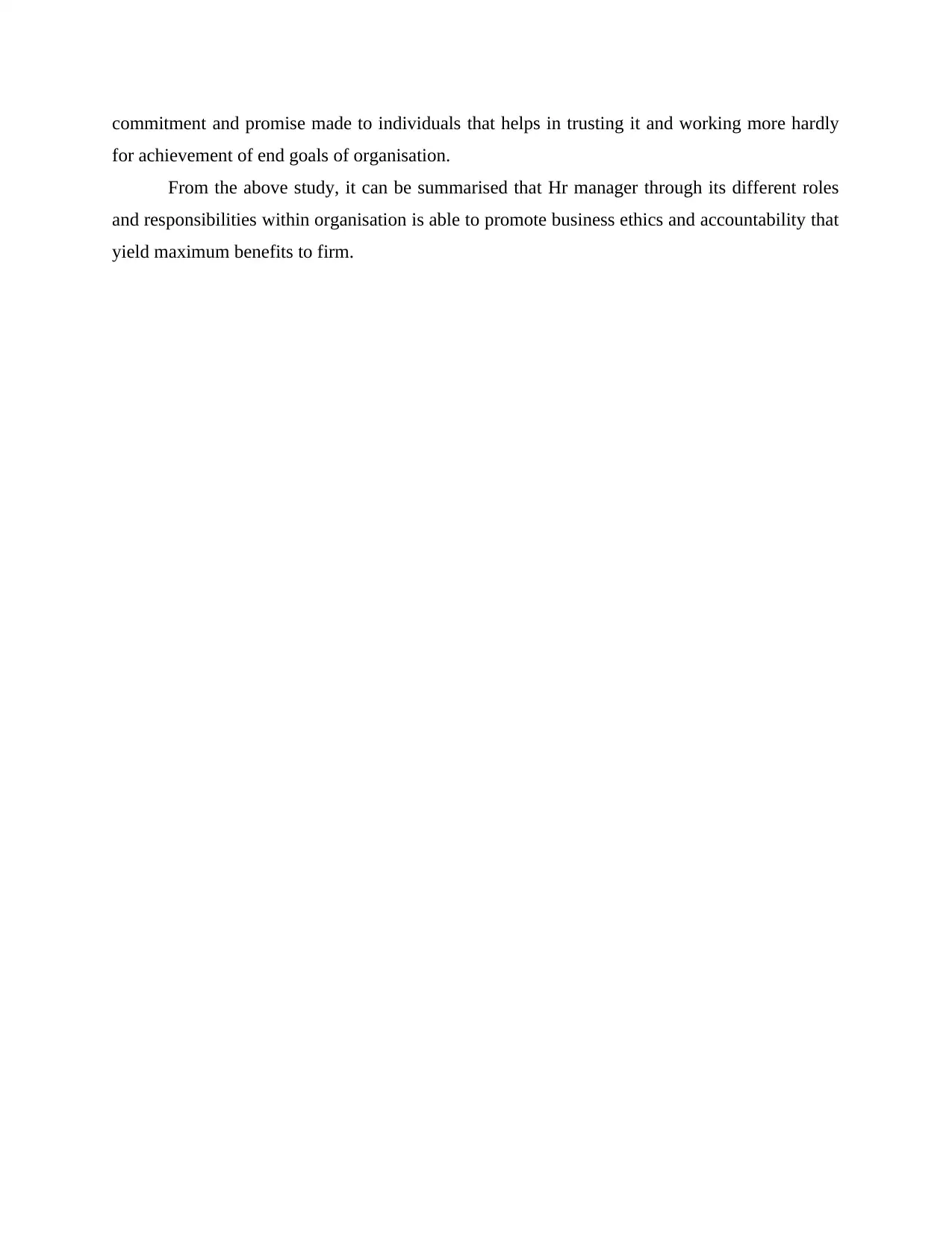
commitment and promise made to individuals that helps in trusting it and working more hardly
for achievement of end goals of organisation.
From the above study, it can be summarised that Hr manager through its different roles
and responsibilities within organisation is able to promote business ethics and accountability that
yield maximum benefits to firm.
for achievement of end goals of organisation.
From the above study, it can be summarised that Hr manager through its different roles
and responsibilities within organisation is able to promote business ethics and accountability that
yield maximum benefits to firm.
Paraphrase This Document
Need a fresh take? Get an instant paraphrase of this document with our AI Paraphraser
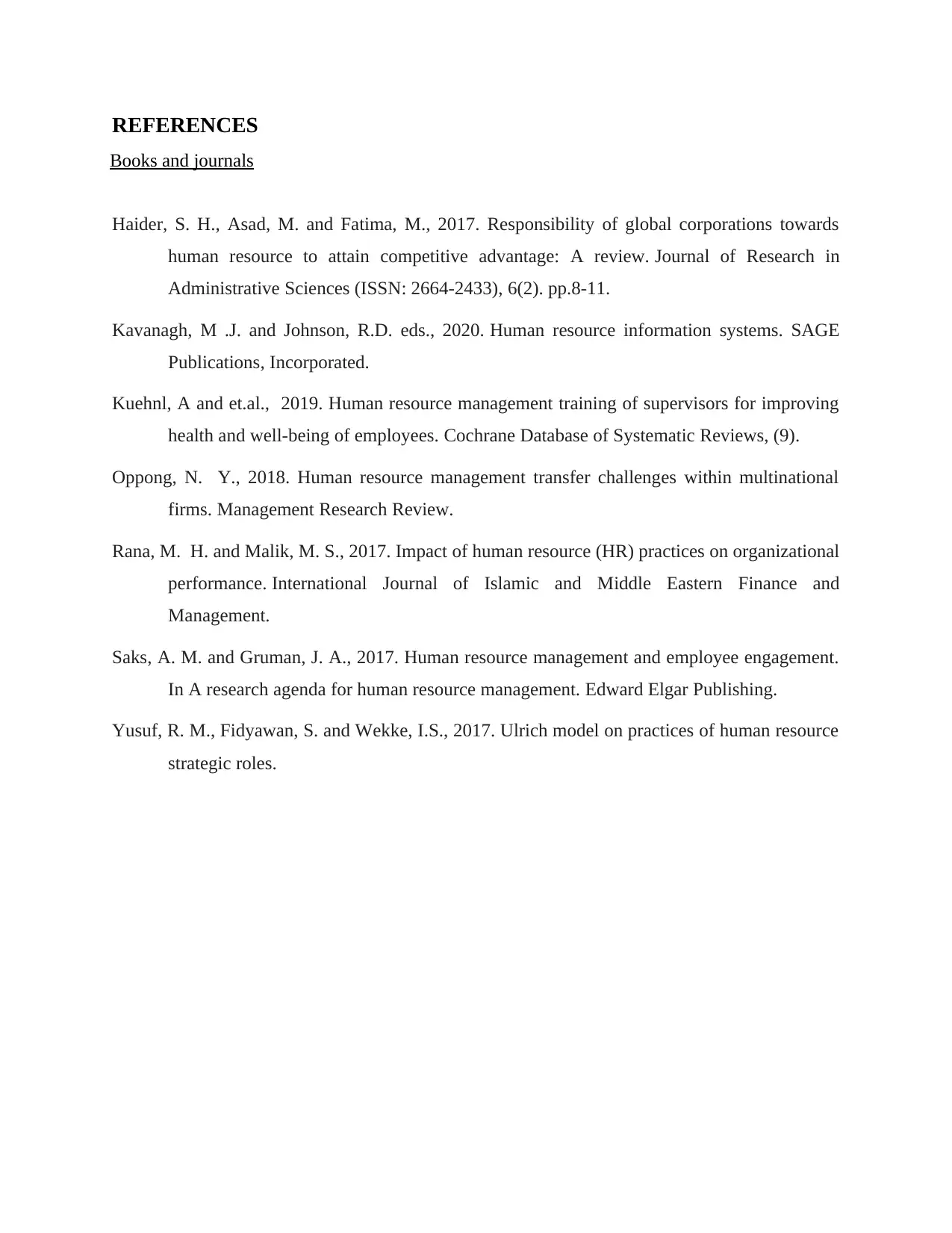
REFERENCES
Books and journals
Haider, S. H., Asad, M. and Fatima, M., 2017. Responsibility of global corporations towards
human resource to attain competitive advantage: A review. Journal of Research in
Administrative Sciences (ISSN: 2664-2433), 6(2). pp.8-11.
Kavanagh, M .J. and Johnson, R.D. eds., 2020. Human resource information systems. SAGE
Publications, Incorporated.
Kuehnl, A and et.al., 2019. Human resource management training of supervisors for improving
health and well‐being of employees. Cochrane Database of Systematic Reviews, (9).
Oppong, N. Y., 2018. Human resource management transfer challenges within multinational
firms. Management Research Review.
Rana, M. H. and Malik, M. S., 2017. Impact of human resource (HR) practices on organizational
performance. International Journal of Islamic and Middle Eastern Finance and
Management.
Saks, A. M. and Gruman, J. A., 2017. Human resource management and employee engagement.
In A research agenda for human resource management. Edward Elgar Publishing.
Yusuf, R. M., Fidyawan, S. and Wekke, I.S., 2017. Ulrich model on practices of human resource
strategic roles.
Books and journals
Haider, S. H., Asad, M. and Fatima, M., 2017. Responsibility of global corporations towards
human resource to attain competitive advantage: A review. Journal of Research in
Administrative Sciences (ISSN: 2664-2433), 6(2). pp.8-11.
Kavanagh, M .J. and Johnson, R.D. eds., 2020. Human resource information systems. SAGE
Publications, Incorporated.
Kuehnl, A and et.al., 2019. Human resource management training of supervisors for improving
health and well‐being of employees. Cochrane Database of Systematic Reviews, (9).
Oppong, N. Y., 2018. Human resource management transfer challenges within multinational
firms. Management Research Review.
Rana, M. H. and Malik, M. S., 2017. Impact of human resource (HR) practices on organizational
performance. International Journal of Islamic and Middle Eastern Finance and
Management.
Saks, A. M. and Gruman, J. A., 2017. Human resource management and employee engagement.
In A research agenda for human resource management. Edward Elgar Publishing.
Yusuf, R. M., Fidyawan, S. and Wekke, I.S., 2017. Ulrich model on practices of human resource
strategic roles.

⊘ This is a preview!⊘
Do you want full access?
Subscribe today to unlock all pages.

Trusted by 1+ million students worldwide
1 out of 9
Related Documents
Your All-in-One AI-Powered Toolkit for Academic Success.
+13062052269
info@desklib.com
Available 24*7 on WhatsApp / Email
![[object Object]](/_next/static/media/star-bottom.7253800d.svg)
Unlock your academic potential
Copyright © 2020–2026 A2Z Services. All Rights Reserved. Developed and managed by ZUCOL.





